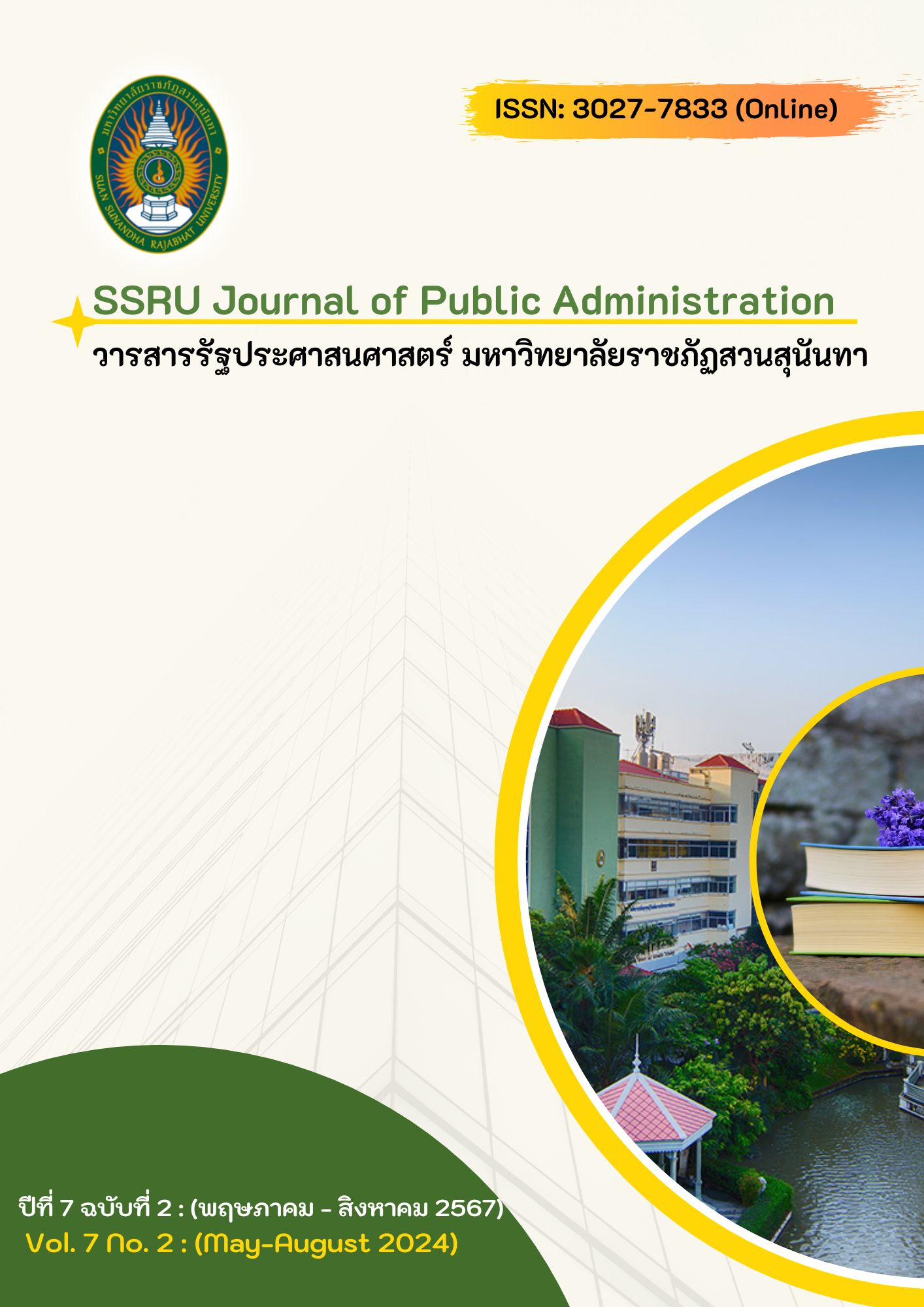แบบจำลองความสำเร็จของธุรกิจ SMEs ประเภทเครื่องดื่มกาแฟ ในประเทศไทย
Main Article Content
บทคัดย่อ
วัตถุประสงค์ในการวิจัยครั้งนี้คือ เพื่อศึกษา 1) ระดับของตัวแปรศักยภาพผู้บริหารธุรกิจ นวัตกรรมการจัดการ ประสิทธิภาพของแผนธุรกิจ กลยุทธ์การตลาดดิจิทัล ความคล่องตัวขององค์กร และความสำเร็จของธุรกิจ SMEs ในประเทศไทยประเภทเครื่องดื่มกาแฟ 2) อิทธิพลของตัวแปรศักยภาพผู้บริหารธุรกิจ นวัตกรรมการจัดการ ประสิทธิภาพของแผนธุรกิจ กลยุทธ์การตลาดดิจิทัล และความคล่องตัวขององค์กรที่ส่งผลต่อความสำเร็จของธุรกิจ SMEs ในประเทศไทยประเภทเครื่องดื่มกาแฟ 3) พัฒนาแบบจำลองความสำเร็จของธุรกิจ SMEs ในประเทศไทยประเภทเครื่องดื่มกาแฟ การวิจัยนี้เป็นการวิจัยแบบผสมผสานเชิงปริมาณและเชิงคุณภาพ กลุ่มตัวอย่างคือ ผู้ประกอบการของธุรกิจ SMEs ในประเทศไทยประเภทเครื่องดื่มกาแฟ จำนวน 420 ตัวอย่าง ใช้วิธีการสุ่มตัวอย่างแบบหลายขั้นตอน รวบรวมข้อมูลโดยใช้แบบสอบถาม วิเคราะห์ข้อมูลด้วยสมการโครงสร้าง การวิจัยเชิงคุณภาพใช้วิธีการสัมภาษณ์เชิงลึกจากผู้ประกอบการของธุรกิจ SMEs ในประเทศไทยประเภทเครื่องดื่มกาแฟ และผู้เชี่ยวชาญของธุรกิจ SMEs ในประเทศไทย จำนวน 20 คน โดยเลือกกลุ่มตัวอย่างแบบเจาะจง
ผลการวิจัยพบว่า 1) ระดับศักยภาพผู้บริหารธุรกิจ นวัตกรรมการจัดการ ประสิทธิภาพของเเผนธุรกิจกลยุทธ์การตลาดดิจิทัล ความคล่องตัวขององค์กร และความสำเร็จของธุรกิจ SMEs ในประเทศไทยประเภทเครื่องดื่มกาแฟ มีค่าเฉลี่ยอยู่ในระดับมาก 2) ศักยภาพผู้บริหารธุรกิจ นวัตกรรมการจัดการ ประสิทธิภาพของเเผนธุรกิจกลยุทธ์การตลาดดิจิทัล ความคล่องตัวขององค์กร มีอิทธิผลต่อความสำเร็จของธุรกิจ SMEs ในประเทศไทยประเภทเครื่องดื่มกาแฟ อย่างมีนัยสำคัญทางสถิติที่ระดับ .05 และ 3) แบบจำลองความสำเร็จของธุรกิจ SMEs ในประเทศไทยประเภทเครื่องดื่มกาแฟ ที่ผู้วิจัยได้พัฒนาขึ้นมีชื่อว่า S2PIA Model เป็นรูปแบบในการส่งเสริมความการเพิ่มสมรรถนะของการประกอบธุรกิจ SMEs ในประเทศไทยเพื่อเพิ่มศักยภาพในการแข่งขัน และการคงอยู่ของธุรกิจ SMEs ต่อไป
Article Details

อนุญาตภายใต้เงื่อนไข Creative Commons Attribution-NonCommercial 4.0 International License.
เอกสารอ้างอิง
สถาบันอาหาร. (2562). ธุรกิจร้านกาแฟในประเทศไทย. ค้นเมื่อ 27 สิงหาคม 2567, จาก https://fic.nfi.or.th/market-intelligence-detail.php?smid=207
Busser, J. A. & Shulga, L. V. (2019). Involvement in consumer-generated advertising: Effects of organizational transparency and brand authenticity on loyalty and trust. International Journal of Contemporary Hospitality Management, 31(4),1763-1784.
Chiang, W.Y. (2018). Applying data mining for online CRM marketing strategy: An empirical case of coffee shop industry in Taiwan. British Food Journal, 120(3), 665-675.
Cronbach, L. J. (1951). Coefficient alpha and the internal structure of tests. Psychometrika, 16(3), 297-334.
Diamantopoulos, A., Siguaw, J. A., & Cadogan, J. W. (2000). Export performance: The impact of cross-country export market orientation. In American Marketing Association. Conference Proceedings (p.177). Chicago: American Marketing Association.
Fonseka, K., Jaharadak, A. A. & Raman, M. (2022). Impact of E-commerce adoption on business performance of SMEs in Sri Lanka; moderating role of artificial intelligence. International Journal of Social Economics, 49(10), 1518-1531.
Hamidinava, F., et al. (2021). A model of business intelligence on cloud for managing SMEs in COVID-19 pandemic (Case: Iranian SMEs). Kybernetes, 52(1), 207-234.
Likert, R. (1932). A technique for measurement of attitudes. Archives of Psychology, 140, 5-55.
Liu, H.M. & Yang, H.F. (2020). Network resource meets organizational agility: Creating an idiosyncratic competitive advantage for SMEs. Management Decision, 58(1), 58-75.
Marshall, M. N. (1996). Sampling for qualitative research. Family Practice, 13(6), 522-525.
Njinyah, S. Z. (2018). The effectiveness of government policies for export promotion on the export performance of SMEs Cocoa exporters in Cameroon. International Marketing Review, 35(1), 164-185.
Olaore, G. O., Adejare, B. O. & Udofia, E. E. (2021). The gains and pains of small and medium-scale enterprises (SMEs): the way forward for entrepreneurship development in Nigeria. Rajagiri Management Journal, 15(1), 53-68.
Pulka, B. M., Ramli, A. & Mohamad, A. (2021). Entrepreneurial competencies, entrepreneurial orientation, entrepreneurial network, government business support and SMEs performance. The moderating role of the external environment. Journal of Small Business and Enterprise Development, 28(4), 586-618.
Radulovich, L., Javalgi, R.G. & Scherer, R. F. (2018). Intangible resources influencing the international performance of professional service SMEs in an emerging market: Evidence from India. International Marketing Review, 35(1), 113-135.
Susanto, P., et al. (2021). Entrepreneurial orientation and performance of SMEs: the roles of marketing capabilities and social media usage. Journal of Entrepreneurship in Emerging Economies,15(2), 379-403.
Yildiz, T. & Aykanat, Z. (2021). The mediating role of organizational innovation on the impact of strategic agility on firm performance. World Journal of Entrepreneurship, Management and Sustainable Development, 17(4), 765-786.


